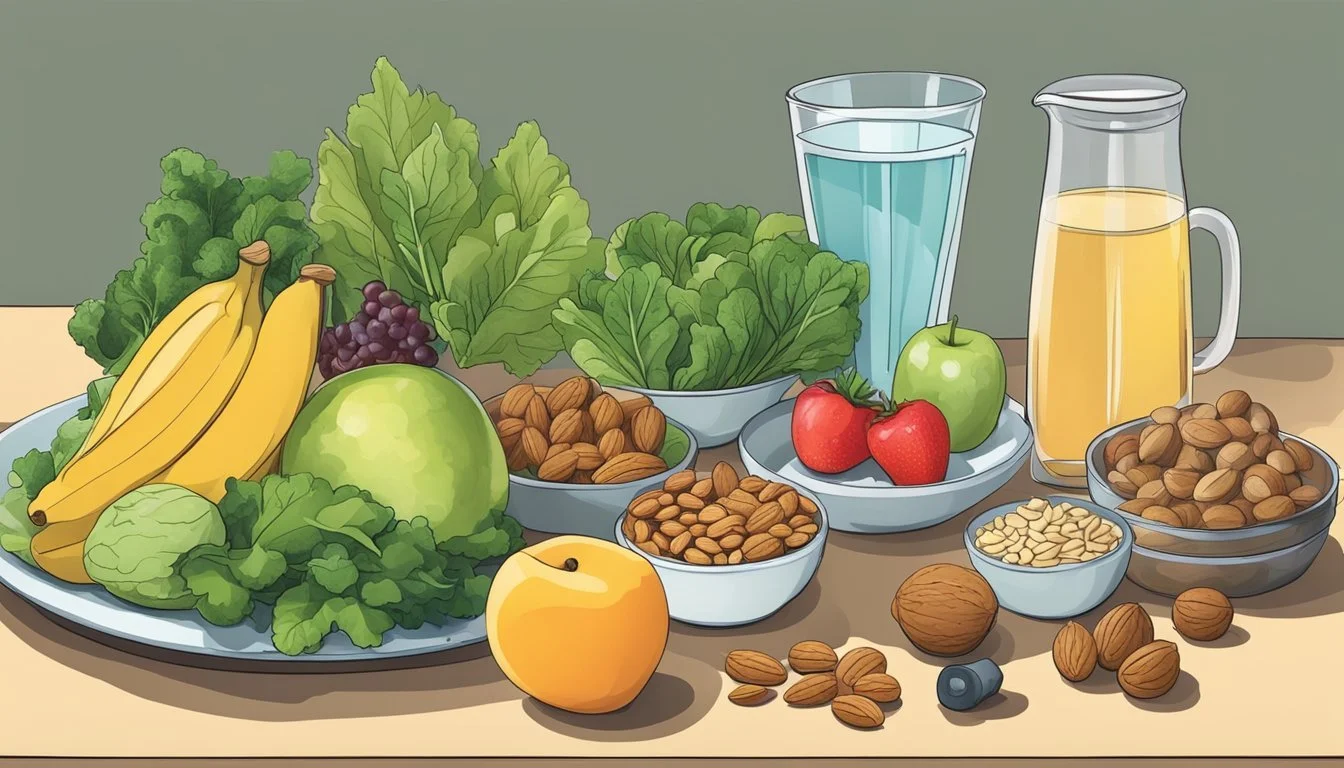Nutrient-Rich Foods to Boost Your Breast Milk Production Naturally
Breastfeeding mothers often seek effective methods to boost their milk supply to ensure their babies get adequate nourishment. A balanced diet featuring specific foods can play a crucial role in enhancing milk production. Understanding which foods can support lactation can help mothers maintain a healthier, more productive breastfeeding journey.
Various natural foods have been linked to increased breast milk supply, providing essential nutrients beneficial for both mother and baby. These dietary choices, combined with proper feeding techniques, offer a practical approach to improving milk output and supporting overall maternal and infant health.
1) Oatmeal
Oatmeal is highly regarded for its potential to boost breast milk production. Many women report noticeable increases in milk supply after incorporating a daily bowl of oatmeal into their diets. This whole grain is rich in iron, which is essential for lactation.
The most beneficial type of oatmeal for enhancing milk supply is slow-cooked old-fashioned oatmeal. Compared to instant oatmeal, it retains more nutrients and provides a better nutritional profile.
In addition to its nutrient density, oatmeal is versatile. It can be prepared in various forms such as porridge, cookies, or even as part of a baked good like bread or cakes. This makes it easy for breastfeeding mothers to include it in their daily meals.
Some studies suggest that oatmeal helps by increasing the levels of prolactin, a hormone that plays a crucial role in milk production. While scientific evidence is limited, anecdotal reports from many breastfeeding mothers support this claim.
In summary, including oatmeal in the diet can be a simple and effective way to potentially improve breast milk supply.
2) Fenugreek Seeds
Fenugreek seeds, known scientifically as Trigonella foenum-graecum, have long been used to support lactation. These small, golden seeds contain natural compounds that may help increase breast milk production.
Studies suggest that fenugreek acts as a galactagogue, a substance that promotes lactation. Many new mothers report noticeable improvements in their milk supply after consuming fenugreek.
Fenugreek can be consumed in various forms, including capsules, teas, and as a spice in foods. Fenugreek tea involves rinsing seeds gently in a strainer and steeping one teaspoon of seeds per cup of water.
The seeds are also rich in fiber and may have additional health benefits like controlling blood sugar levels. This makes fenugreek a multifaceted supplement for nursing mothers.
It's important to consult a healthcare provider before starting any new supplement, including fenugreek. Understanding the proper dosage and monitoring any potential side effects ensures safe and effective use.
3) Garlic
Garlic is a flavorful addition to many dishes and has potential benefits for breastfeeding mothers. It is known to support digestive health, which can be beneficial for both mother and baby.
Studies suggest that garlic may help increase milk supply, making it a popular ingredient among lactating mothers.
However, some babies might react to garlic through breastmilk. In certain cases, it can trigger colic in infants. Observing the baby’s reaction is essential when introducing garlic into the diet.
Garlic contains natural compounds that could promote the production of breast milk. Its potential benefits make it worth considering for breastfeeding mothers looking to enhance their milk supply.
One should start with small amounts of garlic and gradually increase it while monitoring the baby's response. This cautious approach ensures that both mother and baby can safely enjoy the advantages of garlic.
4) Fennel Seeds
Fennel seeds are known for their potential to aid in the production of breast milk. They contain phytoestrogens, which can help stimulate the milk glands. This makes them a popular choice for many lactating mothers.
One of the simplest ways to consume fennel seeds is by making fennel tea. Steep one to three teaspoons of fennel seeds in hot water for about 10 minutes. Strain the seeds and enjoy the tea.
Crushed fennel seeds can also be added to foods for additional flavor and benefits. For those who prefer a snack, roasted fennel seeds make a crunchy and satisfying option. Simply heat the seeds in a dry skillet until they become fragrant.
Fennel seeds are versatile and can be incorporated into various dishes, enhancing both taste and milk production. Whether used in tea, snacks, or meals, they can be a valuable addition to a lactation diet.
5) Spinach
Spinach is highly recommended for breastfeeding mothers due to its rich nutrient profile. It contains significant amounts of iron, calcium, folate, and vitamin K. These nutrients support overall health and lactation.
Spinach is particularly beneficial because of its phytoestrogen content. Phytoestrogens mimic the effects of estrogen in the body, which can enhance milk production.
Consuming spinach can also provide an excellent source of folic acid. Folic acid is crucial for stimulating breast milk production and supporting the baby's growth.
In addition, spinach is rich in nitrates. Nitrates can help the mother produce more milk, making spinach an excellent choice for boosting breast milk supply. Including spinach in the diet of breastfeeding mothers can be an easy and effective way to support lactation.
6) Carrots
Carrots are a nutritious vegetable that can support lactation in nursing mothers. They are packed with beta-carotene, which is converted into vitamin A in the body. Vitamin A is essential for maintaining good vision, immune function, and skin health.
In addition to vitamin A, carrots contain vitamin B6. This vitamin is important for energy production and brain function, which can be beneficial for lactating mothers who need extra energy throughout the day.
Carrots also offer a good amount of fiber. Fiber aids in digestion and can help maintain a healthy gut, which is important for overall well-being. Eating carrots can therefore have multiple benefits for nursing mothers.
Adding carrots to the diet is easy. They can be consumed raw, cooked, or juiced. Carrot sticks, carrot soup, or carrot juice are simple ways to incorporate this vegetable into daily meals.
Another advantage of carrots is their availability. They are commonly found in grocery stores and markets, making them a convenient option for many. Nutrient-rich and versatile, carrots can be a useful addition to a diet aimed at improving breast milk production.
7) Brown Rice
Brown rice is a beneficial complex carbohydrate that can support breast milk production.
It provides the necessary energy for lactating mothers, helping them maintain stamina throughout the day. Brown rice contains essential nutrients, such as fiber and B vitamins, contributing to overall health and well-being.
The fiber content in brown rice aids in digestion, which can be particularly beneficial for postpartum recovery.
Its steady release of energy can help mothers avoid fatigue, ensuring they have the strength to care for their newborns. Additionally, brown rice contains beta glucan, which supports the secretion of prolactin, a hormone crucial for milk production.
Incorporating brown rice into meals can be simple and versatile. It can be used in salads, as a side dish, or in casseroles.
This wholesome grain offers both nutritional benefits and culinary flexibility, making it an excellent addition to a breastfeeding mother's diet. Regular consumption of brown rice can positively influence milk supply and provide sustained energy.
8) Chickpeas
Chickpeas are known to be a beneficial food for lactating mothers. They are rich in essential nutrients like protein, fiber, iron, and vitamins, which support overall health.
Consuming chickpeas can aid in increasing breast milk production. This is due to their composition, which includes phytoestrogens that mimic the body's natural estrogen.
Incorporating chickpeas into a diet can be done in various ways. They can be added to salads, soups, and stews or made into hummus.
Regular moderate consumption of chickpeas can help enhance milk supply. Pairing them with other lactogenic foods like garlic and oats can provide more benefits.
It's important to consume chickpeas in moderation. Overconsumption might lead to digestive discomfort such as gas or bloating.
9) Salmon
Salmon is a rich source of omega-3 fatty acids, which are crucial for the development of a baby’s brain and nervous system. These healthy fats can also benefit the mother by reducing inflammation and improving cardiovascular health.
Salmon provides vitamin D, which plays a significant role in maintaining bone health. This is particularly important for breastfeeding mothers, as their calcium demands increase during this period.
In addition, salmon is a great source of high-quality protein. Protein is essential for the growth and repair of tissues in both the mother and baby, ensuring optimal health and development.
Salmon contains antioxidants like selenium, which supports the immune system. Including salmon in a breastfeeding diet can help protect both the mother and the baby from infections and illnesses.
Salmon can be prepared in various ways, from grilling to baking or steaming, making it a versatile addition to meals. Skinless, boneless salmon portions can be easily incorporated into salads, pastas, and other dishes for convenience and variety.
10) Nuts
Nuts are a nutritious option for breastfeeding mothers aiming to boost their milk supply. High in healthy fats, proteins, and essential vitamins, nuts provide the necessary nutrients that can support lactation.
Almonds, in particular, are often recommended as they contain omega-3 fatty acids, which can enhance milk production.
Cashews and macadamia nuts are other popular choices. They are rich in magnesium and phosphorus, which contribute to overall maternal health.
Pistachios offer beneficial antioxidants, while walnuts contain alpha-linolenic acid, a type of omega-3 fatty acid.
Including a variety of these nuts in the diet can be beneficial for those seeking to increase their milk supply naturally.
Nutritional Needs During Lactation
Proper nutrition is crucial during lactation to ensure both the mother and the baby receive the necessary nutrients. This section covers the key dietary components required.
Calories and Macronutrients
Lactating women typically need an additional 450-500 calories per day. These calories should come from nutrient-rich foods to support milk production and overall health.
Protein is essential; sources include lean meats, eggs, dairy, legumes, and nuts. Healthy fats are also important. Good choices are avocados, olive oil, and fatty fish like salmon. Carbohydrates should come from whole grains, fruits, and vegetables for sustained energy and essential vitamins.
Essential Vitamins and Minerals
Iron supports energy levels and can be found in red meats, leafy greens, and fortified cereals. Calcium is crucial for both mother and baby’s bone health; dairy products, fortified plant milks, and leafy greens are good sources.
Vitamin D helps with calcium absorption. Sun exposure, fortified foods, and supplements can help meet needs. Folate, found in leafy greens, beans, and fortified cereals, is necessary for cell production and function. Omega-3 fatty acids are important for brain development and can be sourced from fish, flaxseeds, and chia seeds.
Hydration Importance
Adequate hydration is essential during lactation. It is recommended to drink about 3 liters of fluids daily. Water is the primary source, but hydration can also come from milk, herbal teas, and soups.
Signs of dehydration include dark-colored urine, dizziness, and dry mouth. It’s important for mothers to drink fluids regularly, particularly before and after nursing sessions, to support milk production and maintain health.
How Diet Affects Breast Milk Production
Food choices and maintaining a balanced diet play crucial roles in impacting breast milk production. Understanding how different foods and a nutritious diet contribute can help breastfeeding mothers ensure their baby gets the best nutrition.
Impact of Food Choices
Certain foods are thought to enhance milk production. Whole grains like oatmeal and barley are commonly recommended. Oatmeal, in particular, is believed to support the hormones responsible for milk production.
Hydration is vital. Drinking plenty of fluids, including water, herbal teas, and broths, can help maintain milk supply. Some foods, such as fenugreek and fennel seeds, are traditionally used to boost milk production, though scientific evidence varies.
Alcohol consumption can negatively affect milk production. Limiting alcohol and ensuring it is metabolized before breastfeeding can prevent any impact on milk supply and quality.
Role of Balanced Diet
A balanced diet ensures that breastfeeding mothers get required nutrients. Proteins, found in lean meats, dairy, and plant-based sources, are essential for milk composition.
Healthy fats, such as those from nuts, avocados, and fish, support the energy demands of milk production. Vitamins and minerals from fruits and vegetables contribute to overall health, which directly impacts milk quality.
Maintaining a moderate caloric intake, around 2,300 to 2,500 calories per day, helps in sustaining milk production without depleting the mother's nutrient reserves. Regular meals with a variety of foods support both the mother and the baby's nutritional needs.
Common Myths About Breast Milk Production
New mothers often encounter various myths regarding breast milk production. These misconceptions can create unnecessary stress and confusion. Below, key myths are addressed, providing clarity based on factual information.
Myth: Certain Foods Instantly Boost Supply
A prevalent myth is the belief that consuming specific foods will quickly increase milk supply. Foods like oatmeal and barley are commonly cited as "breastfeeding foods."
While these foods can be part of a healthy diet, there is no single food that will instantly boost milk production. Effective milk production relies primarily on frequent breastfeeding sessions and proper latch of the baby, as well as overall hydration and nutrition.
Myth: Dairy Intake Directly Increases Milk Quantity
Another common misconception is that consuming more dairy products directly increases milk quantity for the nursing mother. The intake of dairy products does not correlate with an increase in breast milk production.
Milk supply is more influenced by the frequency of breastfeeding and how well the milk is being removed from the breast. While dairy products are a good source of calcium and other nutrients, they do not have a direct impact on milk production itself.
Informed choices enable mothers to focus on practices that genuinely support lactation.








